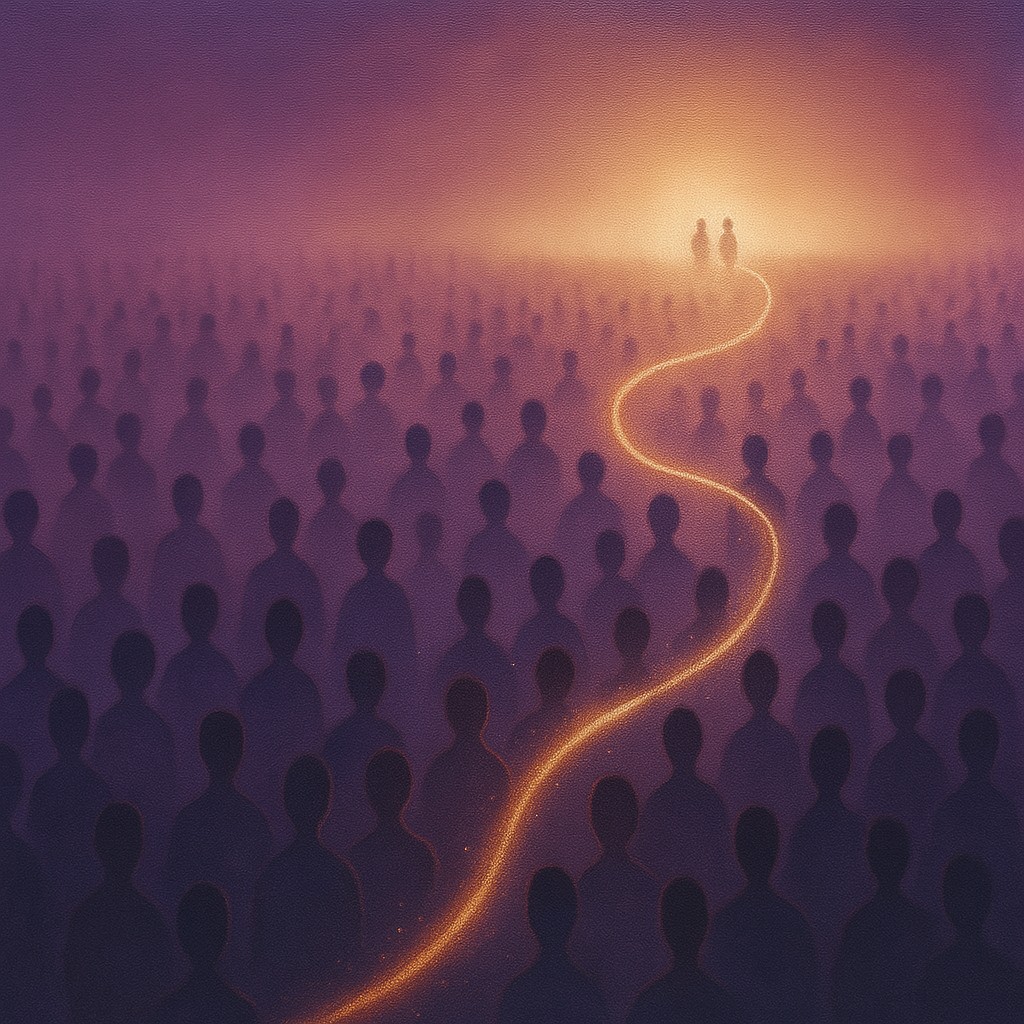The fate of humanity is in our hands
Hans Jacob Huun Thomsen is deputy leader of the Young Liberal Party and wrote this chronicle in Minerva in November 2023. He has no affiliation with the Center for Long-Term Policy, but we have been allowed to publish the chronicle here because we believe the content is very relevant.

Ki-generated illustration from Midjourney
Main moments
Few people will ever have as much influence on the future as we who live today, believes moral philosopher William MacAskill. But the policy contains institutional obstacles to thinking long-term.
If all of human history were a book, what side would we be on today?
In the book What We Owe the Future (2022), Oxford philosopher William MacAskill asks this question. Despite the fact that some 100 billion people have existed on the planet for more than 300,000 years, MacAskill says that we are possibly only on the first page of the book of human history — and that the book could contain tens of thousands of pages.
In other words: the future is huge. It may be overwhelming to contemplate, but as MacAskill points out; if we truly care about the interests of future generations -- and recognize that they are real human beings with the capacity to feel joy and pain, such as ourselves -- we have a duty to consider how our choices today will affect also their lives.
This is MacAskill's argument for long-termism ethics - or “longtermism,” as it's called in the original language. Namely, that it should be a moral priority to positively influence the long future.
Existential threats
However, it should not be a resting pad that our future may be huge. It can also end abruptly if we do not take it seriously. This fact is a central premise for MacAskill, and is linked to globalisation and technology: whereas in the past most disasters were circumscribed and local, today several of them have the potential to hit all the nooks and crannies of the world at the same time.
The attitude to such threats is probably decisive for whether one allows oneself to be engaged by the book. For many, it can be tempting not to take them seriously. An example is found in The Class Struggle Review of the Book, written by Yohan Shanmugaratnam. He's bored “the vegetarian version of Jordan Peterson,” and describes the book as an excruciatingly long thought experiment. One of the main objections seems to be that the book is not about class struggle: “Why doesn't MacAskill mention the great elephant in the room, capitalism, in a book about the challenges of humanity and the globe?” For anyone who had wanted a book that explained all the problems of increased economic disparities, neoliberalism and too low wealth tax, the book is, of course, a disappointment.
But that's not the kind of threat the book is about. Another Oxford philosopher, and colleague of MacAskill, Toby Ord, writes in the book The Precipice (2020) on some of the existential threats facing humanity—a book that became extra topical two weeks after its publication when the corona pandemic broke out.
Extreme climate change is just one of the existential threats Ord mentions. He highlights artificial intelligence, nuclear war, biological weapons, cosmic disasters and man-made pandemics as threats with a real risk. And while the role of capitalism both in creating and in solving these kinds of challenges is worthy of debate, it is nonetheless on the side of the issue: There are challenges that are global, that have evolved across economic organization and ideology, and where the solutions involve demanding dilemmas no matter how you attack them. The fact that Klassekampen focuses precisely on this is perhaps to be expected, but in a certain sense also illustrates the myopia that makes it difficult to deal with abusive long-term threats.
Ord estimates that the probability that an existential catastrophe will occur in the next hundred years is 1 in 6. In a recent survey, answered by more than 80 experts on existential threats, the median claim was that there is a 20 percent probability of global catastrophe by 2100. The probability of humanity being wiped out was set at 6 percent.
In an analogy, MacAskill compares humanity to a careless teenager. He still has most of his life ahead of him, and the choices he makes can have lifelong consequences. But instead of an ordinary teenager who knows approximately how long he should live, humanity is like a teenager who, for all he knows, can accidentally cause his own death in 5 months, or live for another thousand years.
The system rewards short-sightedness
The analogy is also apt for politics. Because like a careless teenager, politicians rarely think about long-term consequences. Yes, it happens from time to time that one thinks about the next generation and the next decades -- but that's also pretty much where it stops. However, it is not their fault. Our political system, after all, rewards short-sightedness. Ultimately, voters judge our politicians for what they have achieved since the last election. For example, no politicians were punished for missing pandemic preparations. The only thing they were judged on in practice was the handling.
By and large, politics is about what happens here and now. In the Norwegian debate, for example, issues such as taxes, immigration and privatization receive great attention. And by all means, they are also important. But we should also devote more time to the great existential threats facing humanity. After all, it is significantly cheaper to prevent than to repair. Both climate change and the corona pandemic should be clear examples of this.
A familiar counterargument is that it is in our human nature to care about what is close -- both geographically and temporally. After all, it is part of our biological heritage to be more concerned with dangers relevant to our own survival.
However, that does not mean that it is morally correct. Just because something is descriptively true doesn't mean it's the normatively correct thing to do. A life is a life, no matter where in the world it is located, and at what time. It is a realization that should also have political implications. We need to expand our moral circle. Not only geographically, but also in time.
One who early formulated thoughts around just this was Edmund Burke, who in Reflections on the Revolution in France writes about the societal contract precisely as a partnership between the living, the dead, and those yet to be born. But too often conservatism has focused more on the consideration of preserving what they built that are now dead, than on preserving a good world for the unborn.
The best is the worst enemy of the good
One potential objection to MacAskill, however, is his time horizon, when, for example, he asks the reader to imagine the world in 3023, thinking about our future in an almost cosmic perspective. The question here is not just how far our moral responsibilities extend, but whether or not we can really meaningfully make choices today given such a time horizon. It can quickly become like criticising Harald Hårfagre for failing to consider the implications of possible oil discoveries off Hafrsfjord and their significance for climate change more than a thousand years later.
Yet it is possible to accept MacAskill's argument that we should pay more attention to future generations, without postulating unbounded ambition for the long-term consequences of today's decisions. The fact that it is difficult to predict the future is not an argument for not to try to prevent long-term threats. As you know, the best is the worst enemy of the good.
Another key argument for MacAskill is that few people will ever have as much influence on the future as we who live today. With today's extremely rapid technological, social and environmental changes, we are at a critical point in history where the choices we make today could have profound implications for the future. He argues that the values that guide civilization, and which can shape the future, are still malleable.
Here, too, as moral philosophers like to do, MacAskill uses an analogy. He compares the story to a molten glass. At the moment, the glass is hot, and can be shaped in many different directions. But at some point, the glass will get cold, and it will be much more difficult to change it. Whether the glass becomes gorgeous, deformed or broken depends on what you do while it's still hot.
Long-Term Politics
More practically oriented, the fledgling think-tank Center for Long-Term Policy has in a recent note presented three proposals for a longer-term policy. It includes 1) an ombudsman for the future, which is supposed to safeguard the interests of the largest voiceless group: future generations; 2) amending the Constitution to make clear that we have a duty to ensure that future generations receive an acceptable standard of living; and 3) that the government puts forward a message to Parliament every four years on long-term threats.
It is, of course, possible to raise different objections to each individual proposal. For example: What kind of real power should a future ombudsman have? And how do you think actually that politicians should be able to fulfil a constitutional provision to take account of the future — in a situation where very many of the really long-term threats are global and far beyond Norwegian political control?
Nevertheless, we should welcome the debate with open arms. A message on long-term threats every four years could at least contribute more knowledge about what we face in more fields than just welfare state funding, as highlighted in the Perspective Message. We need an honest discussion about how our choices today can affect the vast future humanity hopefully has ahead of it.
Then politicians can't just think about the next election. We also need to think about the next generation. And the thousands of generations that our future may contain.
More from Langsikt

This is how budget growth can be slowed
The government should get help to stop new spending. It comes out in the state's own evaluation.

Politics for the Future: How to better include the interests of future generations in Norwegian politics
Four proposals for institutional changes. Memo will be published no later than Wednesday, August 25.

What do we owe the future?
It may seem obvious that Norway should contribute more to combating climate change. But must Norway always do what is best for the world?
